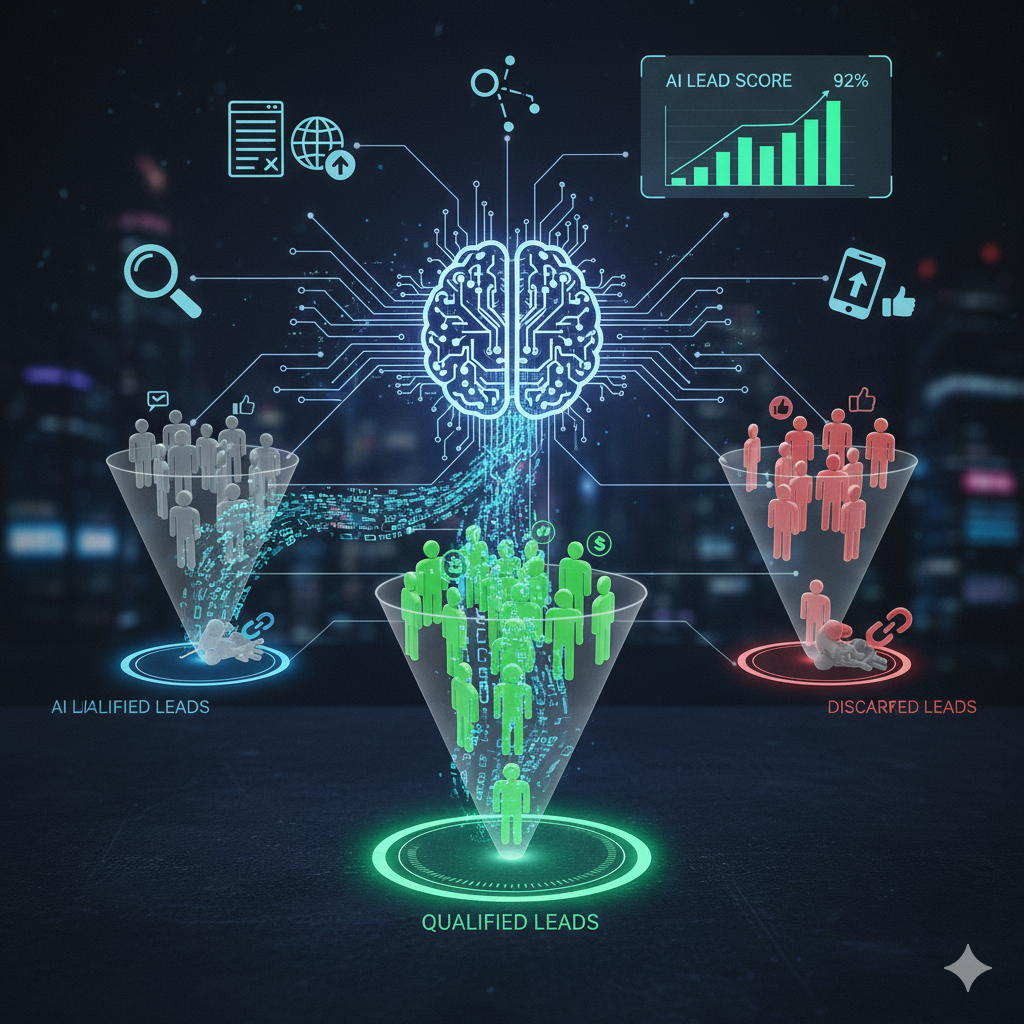Are you wasting 30-40% of your sales team’s time on unqualified leads? While traditional qualification methods struggle with 30-60% accuracy rates, AI-powered lead scoring is achieving something remarkable—but the real game-changer might surprise you.
Check out more data driven facts in our previous post: https://amzoraltd.com/ai-marketing-automation-vs-crm-integration-for-sales/
Key Takeaways
- AI lead scoring achieves accuracy rates between 85-90% compared to traditional methods’ 30-60%, delivering significantly better lead qualification results
- Companies using AI-powered lead scoring report an average increase of 25-30% in conversion rates and 138% ROI versus 78% with traditional approaches
- Machine learning analyses thousands of variables in real-time, eliminating human bias whilst traditional methods rely on static, manual processes
- Real-world case studies demonstrate measurable improvements in lead quality and sales performance through AI implementation
Sales and marketing teams face mounting pressure to identify high-quality leads efficiently whilst maximising conversion rates. The choice between AI-powered lead scoring and traditional qualification methods has become critical for revenue growth in today’s competitive marketplace.
AI Lead Scoring Achieves 85-90% Accuracy Compared to 30-60% Traditional Methods
The accuracy gap between AI and traditional lead scoring represents a fundamental shift in how businesses qualify prospects. AI-powered systems consistently deliver 85-90% accuracy rates by analysing vast datasets and identifying subtle patterns that human evaluators typically miss. Traditional methods, relying on manual frameworks like BANT (Budget, Authority, Need, Timeline) or CHAMP, typically achieve accuracy rates ranging from 30-60% depending on the model and data quality due to their static, rule-based approach.
This accuracy difference stems from AI’s ability to process thousands of data points simultaneously, including behavioural signals, demographic information, and engagement patterns. Content Marketing Agent specialises in helping organisations implement these advanced AI solutions to transform their lead qualification processes. Traditional scoring systems, by contrast, typically consider only a handful of predetermined criteria, making them vulnerable to changing market conditions and customer behaviours.
The implications extend beyond mere percentages. Higher accuracy translates directly to improved sales efficiency, reduced time wastage on unqualified prospects, and increased revenue per sales representative. Companies report that AI scoring helps them focus resources on leads with genuine conversion potential rather than pursuing prospects unlikely to purchase.
Traditional Lead Qualification’s Fatal Flaws
Manual Lead Qualification Processes Create Time-Consuming Inefficiencies
Traditional lead qualification consumes 30-40% of sales representatives’ working hours, creating significant operational bottlenecks. Manual processes require extensive discovery calls, email exchanges, and CRM research to evaluate each prospect individually. This time-intensive approach prevents sales teams from focusing on high-value activities like closing deals and building relationships with qualified prospects.
The manual nature introduces inconsistencies across different team members, with qualification decisions varying based on individual experience, intuition, and subjective judgement. Sales managers struggle to maintain standardised evaluation criteria when human interpretation drives the process, leading to unpredictable pipeline quality and forecasting challenges.
Traditional Methods Lack Precision Leading to Lower Conversion Rates
Industry benchmarks suggest that the average MQL-to-SQL conversion rate typically ranges from 10% to 20%, indicating significant challenges in lead qualification processes. This statistic highlights fundamental flaws in conventional qualification approaches that rely on surface-level indicators rather than predictive analytics.
Traditional scoring assigns arbitrary point values to specific actions without considering the broader context or timing of prospect behaviours. A lead might receive points for downloading content or attending webinars, but these activities don’t necessarily indicate purchase intent or budget availability. The lack of nuanced analysis results in misclassified prospects and wasted sales efforts.
Static Models Use Fixed Point Assignments While Markets Change Rapidly
Traditional lead scoring systems operate on fixed rules that require manual updates as market conditions evolve. These static models cannot adapt to changing customer behaviours, new product launches, or shifting industry dynamics without human intervention. The delay between market changes and scoring model updates creates gaps where valuable leads slip through qualification processes.
Furthermore, traditional models struggle with seasonal variations, economic fluctuations, and emerging buyer personas. What constitutes a qualified lead in one quarter may differ significantly in the next, but static scoring systems lack the flexibility to recognise these shifts automatically.
How AI Lead Scoring Transforms Sales Performance
Machine Learning Analyses Thousands of Variables in Real-Time
AI lead scoring systems process extensive datasets including behavioural patterns, demographic characteristics, firmographic details, and engagement histories. Machine learning algorithms identify correlations between multiple variables that human analysts would find impossible to track manually. These systems continuously analyse website interactions, email engagement rates, social media activity, and content consumption patterns to build detailed prospect profiles.
Real-time processing ensures that lead scores update instantly as prospects interact with marketing touchpoints. When someone downloads an eBook, attends a webinar, or visits pricing pages, the AI immediately recalculates their qualification score based on these new data points. This dynamic approach provides sales teams with current information rather than outdated assessments.
Predictive Analytics Eliminate Human Bias and Inconsistency
Human qualification decisions often suffer from cognitive biases, emotional reactions, and inconsistent application of criteria. AI systems remove these subjective elements by making data-driven decisions based on historical performance patterns. Machine learning models identify which characteristics and behaviours correlate most strongly with successful conversions, creating objective scoring frameworks.
The elimination of bias ensures that all leads receive fair evaluation regardless of company size, industry, or geographic location. AI focuses purely on conversion probability based on proven indicators, preventing valuable prospects from being overlooked due to human preconceptions or preferences.
Seamless CRM Integration Accelerates Revenue Growth
Modern AI lead scoring platforms integrate directly with existing CRM systems, providing unified views of prospect information and qualification scores. Sales representatives access updated lead scores within their familiar CRM interface without switching between multiple applications or manually importing data.
This integration enables automated workflows that trigger specific actions based on scoring thresholds. High-scoring leads can automatically route to senior sales representatives, whilst medium-scoring prospects enter nurturing sequences. The seamless data flow eliminates administrative overhead and ensures rapid response to qualified opportunities.
Measurable Business Impact: AI vs Traditional Methods
25-30% Higher Conversion Rates with AI-Powered Scoring
Companies implementing AI lead scoring consistently report 25-30% improvements in conversion rates compared to traditional qualification methods. This increase stems from AI’s ability to identify prospects with genuine purchase intent rather than surface-level engagement. Sales teams spend time on leads with higher probability of closing, resulting in more efficient resource allocation and better outcomes.
The conversion rate improvement compounds over time as machine learning models become more sophisticated through continuous data analysis. AI systems learn from successful and unsuccessful conversions, refining their predictive accuracy and delivering increasingly better lead recommendations to sales teams.
138% ROI Compared to 78% with Traditional Methods
The return on investment differential between AI and traditional lead scoring reflects the cumulative benefits of improved accuracy, efficiency, and conversion rates. AI-powered systems deliver 138% ROI by reducing wasted sales efforts, accelerating deal closure times, and increasing average deal values through better prospect targeting.
Traditional methods’ 78% ROI reflects the substantial time and labour costs associated with manual qualification processes. The lower return highlights how human-intensive approaches consume resources without delivering proportional revenue benefits, making them increasingly unsustainable in competitive markets.
31% Faster Lead Evaluation Processing
AI systems evaluate leads 31% faster than traditional methods by automating data analysis and qualification decisions. Prospects receive immediate scoring upon entering the sales funnel, enabling rapid response times that improve conversion probabilities. Traditional methods require days or weeks for thorough manual evaluation, during which interested prospects may lose momentum or engage with competitors.
Faster processing also improves customer experience by ensuring prompt follow-up communications and personalised outreach based on qualification scores. Speed becomes a competitive advantage that helps businesses capture opportunities before rivals respond.
Real-World Success Stories
Salesforce Einstein Improves Lead Conversion Through AI-Powered Scoring
Salesforce Einstein’s AI lead scoring implementation demonstrates the practical benefits of machine learning in lead qualification. The platform analyses customer interactions across multiple touchpoints, identifying patterns that indicate purchase readiness. Companies using Einstein report improved lead conversion rates due to better prospect targeting and prioritisation.
Einstein’s success stems from its ability to learn from historical sales data and customer behaviours, creating predictive models that identify high-value opportunities. The system continuously refines its algorithms based on actual conversion outcomes, improving accuracy over time.
HubSpot’s AI Transforms Opportunity Management with Predictive Insights
HubSpot’s AI-driven lead scoring helps businesses prioritise opportunities more effectively through predictive analytics and behavioural analysis. The platform integrates multiple data sources to create detailed prospect profiles that guide sales strategies and resource allocation decisions.
Companies using HubSpot’s AI scoring report improved sales efficiency and higher conversion rates due to better lead qualification accuracy. The system’s ability to predict which prospects are most likely to convert enables sales teams to focus efforts on opportunities with the highest success probability.
AI Lead Scoring Delivers Superior Revenue Growth for Modern Sales Teams
The evidence overwhelmingly supports AI lead scoring’s superiority over traditional qualification methods in accuracy, efficiency, and business impact. Companies adopting AI-powered approaches achieve measurably better results through improved conversion rates, faster processing times, and higher return on investment. Traditional methods, whilst familiar, cannot compete with AI’s ability to analyse vast datasets, eliminate human bias, and adapt to changing market conditions.
The transformation from manual to AI-driven lead qualification represents more than technological advancement—it’s a strategic necessity for businesses seeking competitive advantage in increasingly complex sales environments. Sales and marketing teams that adopt AI scoring position themselves for sustained revenue growth through superior lead prioritisation and resource allocation.
Ready to transform your lead qualification process with AI-powered scoring solutions? Learn how Content Marketing Agent can help you implement advanced lead scoring systems that drive measurable revenue growth for your sales team.


